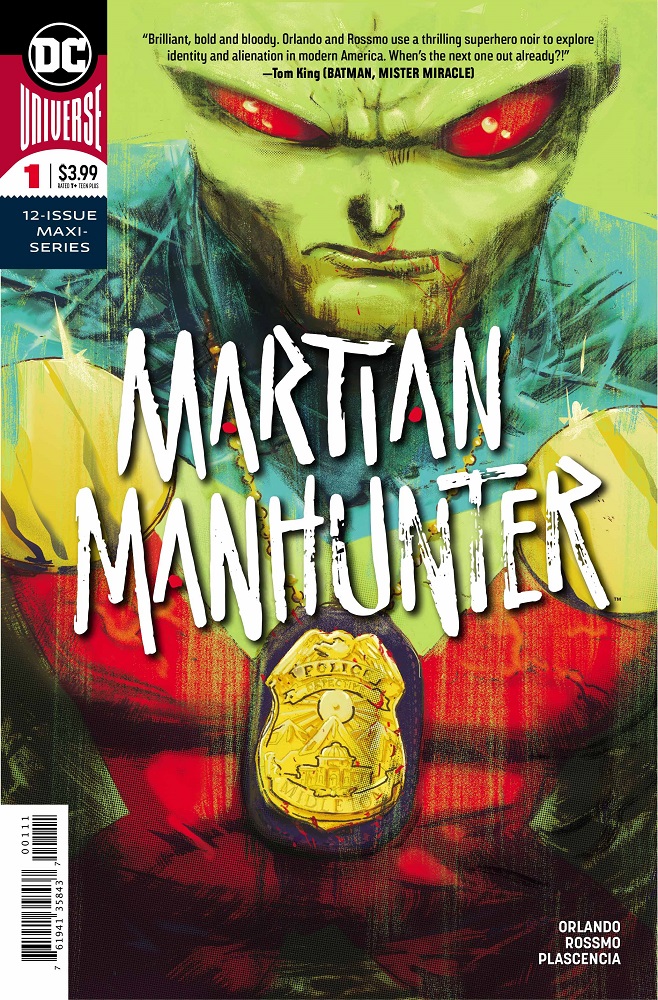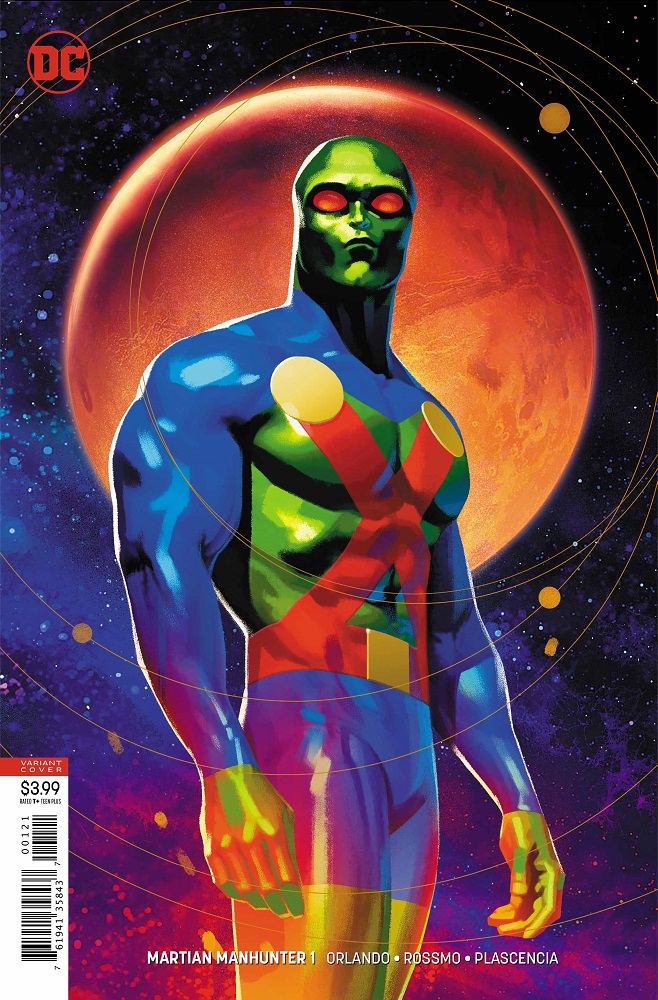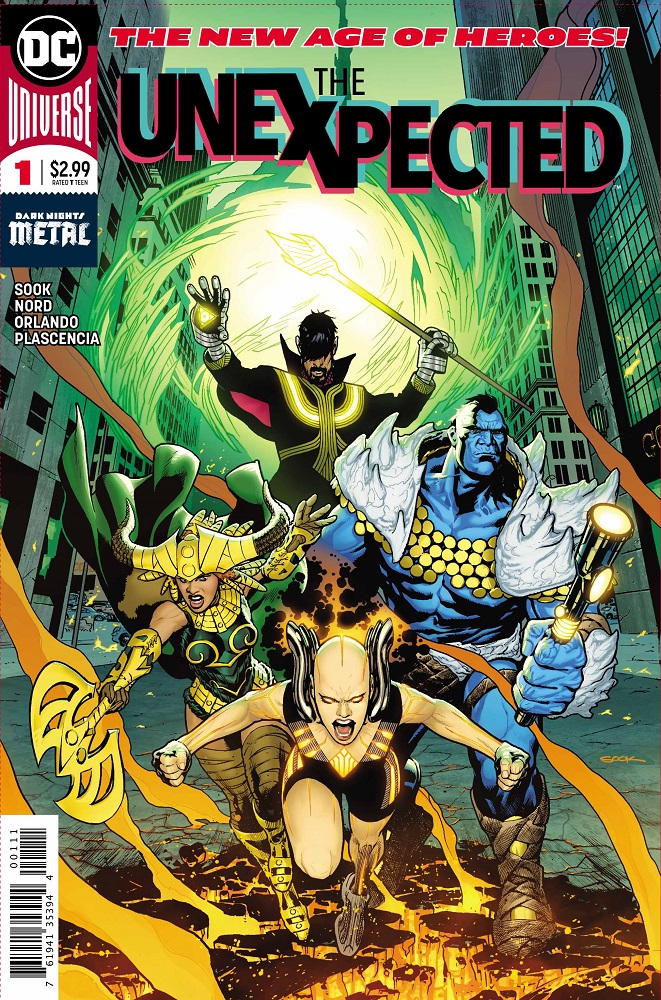Over the past year, writer Steve Orlando has written some truly unique and definitive comics. From the delightfully weird and extremely thought-provoking Milk Wars crossover between the DC Universe and DC Young Animal characters earlier this year, to the bold, character-defining, Martian Manhunter, everything Orlando is writing carves something new into the DC Universe. Recently, I had the privilege of asking some in-depth questions following the release of Martian Manhunter #2, as well as some questions about his recently finished series The Unexpected and his current mini-series Electric Warriors. What follows is a lot of great insight into both the mind of J’Onn J’Onzz as well as the mind of Steve Orlando himself, and the importance Orlando places on emotional honesty is truly rewarding to see as a reviewer and a fan.

DC COMICS NEWS: You’ve often described this story as J’Onn’s road to heroism, which is really important because we haven’t really seen that journey for him. Before this series, I think his journey has been largely driven by the fate of others and how that’s affected him. What is it like to write J’Onn’s relationship with his own self?
STEVE ORLANDO: It’s an incredible honor and relief to dig into J’Onn’s relationship with himself. Much like any of us, J’Onn deserves to be defined by himself, not his relationship with or support of others. He’s an icon in the DC Universe, so to be able to spend years building J’Onn’s world and designing DC’s Mars with Riley, and giving J’Onn the intensely passionate background he deserves, is one of the proudest moments of my career.
DC COMICS NEWS: Can you talk a little bit about what it’s like to translate your ideas about Martian culture onto the page with all of the abilities you and the rest of the amazing team have at your disposal like telepathic word balloons, Deron Bennett’s amazing lettering effects, Riley Rossmo’s transformations of the physical form etc?
STEVE ORLANDO: It’s constantly surprising! The main reason for that is the trust and respect within the creative team. Martian Manhunter is in no way my sole creation, it is made through true collaboration, with a looser script format that gives more freedom not just to Riley, but also Deron and Ivan. We ask questions of each other, challenge each other creatively with this Martian Culture that must be wholly alien, and then we give each other room to answer and meet these challenges. We trust each other to be the best we can be and deliver, and the book comes together organically in a way that is surprising not to just me as the writer, but to everyone involved, once it’s complete. That electric creative energy comes from the collaboration, and it’s in every page.
DC COMICS NEWS: I find the other works you’ve drawn from outside of the DC Universe such as Barsoom, Across the Universe, and Out of the Silent Planet to be fascinating. Can you talk a little bit more about the research phase and developmental process involved in a series like this?
STEVE ORLANDO: In some ways I’ve been in the research phase for this book my whole life. Mars has always fascinated us as humans, it’s our celestial neighbor that’s just close enough in the sky and in climate that we can’t help but wonder what its stories are. But for Martian Manhunter I specifically wanted to look at the legacy of Martian fiction and Sci-Fi, since this was going to be Riley and I going Hard Sci-Fi in the DC Universe. We put DC’s Mars first, and DC lore first, and then we peppered in the references to Mars fiction as a whole, culled from reading both the classics of Mars fiction and the newest scientific news about Mars. This was the gilding of a the love letter to DC’s own history with Mars in its books, to create this Hard Sci-Fi comic that weaves together the best of Mars fiction from across media and across over a century of literature.
DC COMICS NEWS: There’s also definitely been an importance placed on Martian history and religion through details such as how they value museums and preservation and the Gods and Goddesses you’ve named so far such as C’Eridyall, L’Zoril, and H’Ronmeer. What role do Martian history and religion play in this series?
STEVE ORLANDO: The history and religion of Mars is there to bolster the reality, and relatability, of life on Mars. As these concepts are often central to our lives as humans, they needed to be central to the lives of our Martians as well. All the cultural details of Martian Manhunter are part of one of the book’s core goals – deliver the realest, most in-depth Martian worldbuilding you’ve ever found in a DC Comic or in any comic for that matter. If it’s a pillar of our society, Riley and I set out to reflect it through our Martian lens and deliver a vision of what those concepts could look like on a world completely alien.
DC COMICS NEWS: Following up on relatability, in Martian Manhunter #2, we get a sense of J’Onn’s relationship with his parents, and it’s one he seems to be struggling with in a way many of us humans many find familiar. Why was it important to include that as part of J’Onn’s life on Mars?
STEVE ORLANDO: Much like religion and history, Riley and I wanted to draw a line across the vastness of space to connect our human lived experiences with those of the Martians we’ve created to present to you. You’re right, J’Onn’s issues with his parents and his nacient moment of young adult vulnerability are meant to mirror what many humans face on this world, because even if Mars is different and alien, there are some things, the motions of the heart and of emotional growth, that are universal. This is how we show that – moments alien yet familiar.

DC COMICS NEWS: The notion of secrets is extremely different on Mars, and we see that it is normal to share even one’s most private thoughts with those they love, yet J’Onn has several in the past and present. What role do secrets play in J’Onn’s relationship with his own otherness and his own individuality both in the past and in Middleton?
STEVE ORLANDO: Secrets represent J’Onn’s weaknesses and his compromises. Both on Mars and on Earth, we see that his failures are always protected by secrets, it’s symptomatic of a life that’s spiraled out of his control on both worlds. The Hermitage, which you reference, is supposed to be a symbol of two Martian lovers and their unique spiritual connection. But instead J’Onn uses it to hide his compromises. He turns what should be beautiful into something less-than. And as the series goes forward, these secrets are goalposts for J’Onn, they’re the things he must overcome to make himself whole and become the hero he’s always said he was…now’s the time to make it a reality.
DC COMICS NEWS: Emotions really play an important role in this series as you take universal truths like love, compassion, and loss and find new ways for a totally unique culture to express them. One thing that combines the both of those is the concept of empathy. Martians’ relationships with telepathy and each other would seemingly make their ability to empathize at level we may not be able to fathom. How does J’Onn’s sense of empathy affect his behavior on Earth?
STEVE ORLANDO: I think J’Onn’s telepathy, and his emotional empathy, is one of the sources of his greatest pain when Martian Manhunter begins. And why? Because he’s hiding from what he is. He’s cut out a formerly massive part of his Martian life because, on Earth, it’s one of the things that most reminds him of Mars and his failure to save his family. Empathy for J’Onn is defined by its absence as the story begins, and he’s starved for that telepathic connection he once had. As the story progresses it will become less a leaden symbol of his hardships on Mars and more of a symbol of his coming victories on Earth.
DC COMICS NEWS: In many ways, Martian Manhunter #2 presented a number of important connections between physical and mental health. Particularly in the car as J’Onn was having visions and falling apart mentally, he had more difficulty holding his human shape together. How would you say the connection between physical and mental health for Martians is different than for humans?
STEVE ORLANDO: It’s vastly different! As we saw in issue two, the Martian form is intrinsically connected to their mind, personality, and intellect. Before they evolved complex personalities they were just simple shapes floated in ambient gravity. So whereas we tend to think of our minds and bodies as separate things that interact, for Martians, mind and body are essentially the same thing, with the body being the living expression of the mind.
DC COMICS NEWS: This issue pays a great deal of attention to K’Hym J’Onzz, who is one of the cutest beings in comics. What inspired you to write her in this way, and also as the haunting symbol of J’Onn’s past in Middleton?
STEVE ORLANDO: The heartstrings! Riley and I both feel it so strong when we work with K’Hym, knowing what’s coming for her and the rest of Mars. Riley having a young daughter, it is even more emotional for him to draw K’Hym. But the inspiration for her is, as with everything else on Mars, emotional honesty. For us to truly feel K’Hym’s loss and J’Onn’s failure, she must feel like a girl we know, a child we could see outside our window, even if she’s a Martian jellybean that just can’t wait to grow up.
DC COMICS NEWS: Diane Meade is another very important character in the Martian Manhunter mythos. In the past, Diane Meade has often had suspicions that John Jones was the Martian Manhunter, but only after he debuted as a hero. Why was it important that she discover J’onn’s identity before he became a hero?
STEVE ORLANDO: Diane’s discovery sets a fire under their partnership that we all thought was vital to the book. Suspicion isn’t enough, because the story here isn’t her wondering if J’Onn is different, it’s her knowing he is and going on her own journey to accept him or not. It’s about her having to overcome her hurt and betrayal to see and empathize with J’Onn’s pain, as well as do her job and find Ashley Addams. Having Meade find out about J’Onn at the outset instills their every interaction with tension, and her struggles with J’Onn hiding who and what he is then hint at Diane’s own struggles and character depth in a way we’ve never explored in the DCU.
DC COMICS NEWS: After these first two issues, is there anything else you’d like to say as we move forward?
STEVE ORLANDO: So much is coming! We’ve only just begun – the mindscapes of Issue Four and the Incal inspired mayhem of Issue Six are coming, along with one of the strangest births you’ve ever seen. The mystery of Ashley’s disappearance and the crimes of the Manhunters on Mars have only just begun to come to roost on Earth…there is so much more wonder on its way!
——————-
I have certainly felt the passion, emotion, integrity, and knowledge that Steve Orlando, Riley Rossmo, Ivan Plascencia, and Deron Bennett have all put into this one of a kind Maxi-Series, and I hope everyone else can too. We now shift gears a little bit to a brief discussion about Steve Orlando’s recently finished series, The Unexpected, as well as his ongoing miniseries, Electric Warriors.
DC COMICS NEWS: Despite being only 8 issues, The Unexpected seamlessly bridged together so many different events and aspects of the DC Universe. What was the most important thing you wanted readers to take away from this series?
STEVE ORLANDO: The most important message of The Unexpected is the one Neon the Unknown himself sends in the finale, realizing the true way to confront evil is not with a clenched fist of destruction but with an open hand towards counseling and evolution. This is our homage to The Saga of Swamp Thing, where Swamp Thing confronts the Great Darkness and realizes good and evil are but two sides of the same coin. Neon too realizes Mandrakk cannot be destroyed, which would only further his evil narrative. But his action, consumption, which in of itself is not evil, can be redirected and repositioned into something beneficial. This is the heart of the book, taking the things we may write off as negative or evil and trying our best to turn them into a positive, to find the potential for growth in the dark soil of evil, as Swamp Thing himself saw so many years ago.
DC COMICS NEWS: For me, my favorite part was the allegory of creation and destruction presented in the final issue. It is a concept that many comic fans are very familiar with presented in a very new way. What inspired your take on it in this issue?
STEVE ORLANDO: As above, a big inspiration was the Moore and Bissette era of Swamp Thing. With Neon especially, and the team in general, we set out to craft heroes who would work through their problems to ultimately gain a more advanced perspective on good and evil. For the New Age of DC Heroes, we felt in The Unexpected that we had to deliver a new way of thinking, a new approach to heroism, and a fresh take on protecting the future. We had to tackle all the basic tenets of superheroics with a lateral, coming from a different angle.
DC COMICS NEWS: I have to ask, is there a possibility that we may see these characters again in the near or distant future?
STEVE ORLANDO: Always a possibility! I’ve come to love Neon and Firebrand especially, and the world of Ascendant is still out there, adrift in time, a whole society of super science Orcks that the DC Universe has never known about. Whether it’s me, or someone else, I would love for Neon and Firebrand to live on in the fabric of the DCU – every character is just waiting for the right moment…waiting for their moment.
DC COMICS NEWS: On Electric Warriors, after the first two issues, I think that inherent themes of teamwork and resistance emerge. I find the relationship between the two very fascinating because larger resistance often can’t happen without teamwork, but individual resistance frequently occurs between very different individuals like those in Electric Warriors. As Earth tries to get itself out of the predicament it finds itself in, how do those themes come to the forefront?
STEVE ORLANDO: I think the struggle of resistance and teamwork in Electric Warriors is summed up by the idea that individuality and strength need not come at the expense of others. Every member of our group comes from a people who used to be conquerors, expansionist, who defined their greatness by the suppression of that of others. But to truly be a team, they’ll have to understand that real power and real greatness comes from holding others up and rising the tide for all ships, so that all may be strong. It takes introspection, and a subversion of ego, a giving up of one’s old ways and definitions, but it’s also the real way to a sustainably peaceful future.
DC COMICS NEWS: Whether it be in Martian Manhunter, The Unexpected, or Electric Warriors, you are always mining untapped potential. What inspired you to tackle this particular era of the DC Universe?
STEVE ORLANDO: A challenge! I was out to lunch with Dan DiDio, and he slid this challenge across the table (not literally, he slid a cup of coffee across the table) – the challenge to unweave and reweave DC lore to fill a seldom explored era in DC’s timeline. To someone raised on DC Comics with four-color blood, there was no better offer to be heard. An open invitation to explore an era fans had rarely seen before? Next time ask me something hard.
Between Martian Manhunter, The Unexpected, and Electric Warriors, Steve Orlando is writing truly definitive comics. Whether it be defining a character, an era, or connections within the DC Universe, all three do so in extremely powerful ways that resonate with myself and our readers here at DC Comics News.

